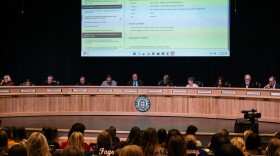
There are plenty of complicated things about recessions, but consumers don't need any declaration or stamp of approval from economists to know when the economy has soured. They can feel it.
A swirl of negative factors, including the collapse of the housing market, consecutive quarters of rising unemployment and the dearth of lending by banks, hit consumers especially hard in September and October, shattering their confidence.
When it comes to the financial turmoil, "it's the worst crisis since the Great Depression," says Jeffrey Frankel, an economics professor at Harvard's Kennedy School of Government, who sits on the Business Cycle Dating Committee of the National Bureau of Economic Research, a nonprofit organization founded in 1920. The committee, which comprises several economists, is responsible for officially calling recessions. And it typically weighs in several months after the fact — once the members have had an opportunity to analyze a broad range of statistics.
So are we in a recession? Most economists say yes and expect the NBER to follow suit. The committee has yet to call this a recession because there hasn't been "even one negative quarter of GDP" so far this year, says Frankel. But that may change next week, when the Commerce Department announces the gross domestic product number for the third quarter. On Thursday, White House Press Secretary Dana Perino said the administration expects the number "not to be a good one."
Frankel says that what's so unique this time around is the depth of the financial crisis. Speaking personally and not for the committee, he says that "it's extremely likely" that we're now in a recession, given the serious problems that have plagued the financial system since mid-2007.
Economist Bruce Yandle, dean emeritus at Clemson University's College of Business and Behavioral Science, says the sharp declines in both total employment and industrial production have created an unsavory stew: "You put all of that in a pot and stir it, and what I taste is recession."
Calling A Recession
Recessions affect the real economy, which encompasses things like jobs, consumer spending and the production of goods and services. Yandle notes that we had a slowing in the real economy long before the financial economy went south with the bailout frenzy. But in September, the financial economy "infected" the real economy, he says, and that's when more economists started using the R-word.
There's no rulebook or checklist that NBER follows to arrive at its decision, but the economists use their definition of a recession as a starting point. They say a recession is "a significant decline in economic activity spread across the economy" that lasts for more than a few months and that manifests itself in real gross domestic product, real income, employment, industrial production and wholesale retail sales. The term "real" refers to figures that have been corrected for inflation.
Others define a recession as two consecutive quarters of decline in real GDP growth. NBER says its definition is broader to incorporate both the depth and duration of the economic downturn.
In general, the economy is either in a recessionary stage, when it is contracting, or in an expansion. But NBER notes there can be diminished economic activity, or a slump, even during an expansion.
Consumer Sentiment
Dennis Jacobe, the chief economist for Gallup, says polls it has conducted demonstrate that people have felt like they're in a recession "for a long time." He says that 80 percent to 90 percent of people believe the economy is worsening. Gallup has registered historic lows in consumer confidence and increased pessimism about the jobs market, which Jacobe says is an indicator that jobs numbers will continue to worsen.
In a mid-October poll, Gallup found that two-thirds of the people surveyed said they've been financially hurt by the financial crisis and 70 percent thought that their financial situation "will be harmed in the long run."
The frozen credit markets have had more than just a fiscal impact. "It's not only the unavailability of money but the psychological effect," Jacobe says. Consumers and small businesses "always thought they could fall back on their credit lines as an emergency source of funding."
But home equity lines of credit have dried up, leaving some dreams in the dust. What's more, the credit culture has chipped away at Americans' savings habits: Jacobe says surveys indicate that only 40 percent of the U.S. population has $10,000 or more in savings that can be easily tapped.
Not Your 'Garden Variety' Recession
Economists say that each recession is unique. So what kind of recession are we in?
Nigel Gault, chief U.S. economist for Global Insight, says the credit problems that underlie this recession have made monetary policy — the Federal Reserve's decisions to infuse funds into the economy or withdraw them — "quite ineffective" in supporting the economy. As a result, Gault says, it's "not a common or garden variety recession at all."
John Schmitt, an economist for the Center for Economic and Policy Research, says he was encouraged this week by Federal Reserve Chairman Ben Bernanke's call for a stimulus package, as it was an acknowledgment that fiscal policy was needed because "monetary policy isn't enough right now."
During the course of the third quarter, the U.S. switched from a "slow motion" recession into a "full-blown recession" when consumer spending took a sharp dive, says Gault.
A number of economists who spoke with NPR used the term "severe" to describe the current scenario. Gault said the prime characteristic of a recession is the breadth of the decline, noting that the large declines we've seen so far have been broad-based across the whole economy — an indication that it's not just one sector that's weighing us down. What's more, he says, it's global in scope.
Labor Market Recessions
Schmitt says labor market recessions, which are different from the recessions identified by NBER, are "what the vast majority of Americans are concerned about." Why? Because in these recessions it takes much longer — several years — for the job market to recover.
The recessions of 1980-1982, 1990-1991 and 2001 all are examples of official recessions, identified by NBER, that were substantially shorter than the labor market recession, says Schmitt. In 2001, the official recession lasted about half a year, but the labor market recession went on for close to three years, he says.
Schmitt says the current recession started in December 2007, and he expects it will be "long and nasty," driven by a continued decline in house prices; he thinks prices may fall another 10 percent to 15 percent. He estimates that we might start to emerge from the recession in December 2009, but the labor market recession probably won't end until 2011, he says.
Recession Deja Vu
Cycles have always been a part of the economic landscape. Recessions are an inevitable part of this, says Gault, because people make mistakes during periods of excessive optimism and confidence.
The recession we're in now is caused by the "bursting of bubbles," especially in the housing market and consumer spending, says Gault. In that aspect, it is similar to the 2001 recession, which followed the collapse of the technology sector.
Economists note that many of the post-World War II recessions were ones that started out with inflation out of control. The Federal Reserve typically responded by raising interest rates, which caused a recession, and inflation came down. The recession between 1980 and 1982, one of the most severe, is a good example of a "stagflation" episode, in which extremely low or negative growth combined with high inflation. But this isn't the case today.
Frankel, the Harvard economist, says the recession between 1973 and 1974 is a "good parallel" because it was severe even though the Fed was following a relatively easy monetary policy, somewhat akin to the situation today. In the 1970s, however, a financial crisis wasn't part of the mix.
He says that the decade of stagflation that Japan went through in the 1990s and the Great Depression in the U.S. may also have some parallels to the situation today: Both were ushered in by the crash in real estate and stock markets. "Hopefully, the difference," he says, "is we know how to handle it better this time."
Copyright 2022 NPR. To see more, visit https://www.npr.org. 9(MDAzMjM2NDYzMDEyMzc1Njk5NjAxNzY3OQ001))






